Revolutionising a city's fleet of motorcycle taxis
- Published
An app to help people in Jakarta beat the traffic has become one of the country's most popular downloads
With Jakarta's traffic gridlocked in the middle of a Friday afternoon rush hour, German expat Jana Hauser thought she had little chance of catching her flight.
From her office near the Indonesian capital's landmark Hotel Indonesia roundabout, the 24-year-old needed to cover the 30km (19 miles) to Jakarta's Soekarno-Hatta International Airport in under an hour.
In a city notorious for its endless traffic jams it seemed impossible.
However, as Ms Hauser was travelling light, one of her colleagues suggested that she tried a new mobile phone-based motorcycle taxi service called Go-Jek.
Downloading the app, Ms Hauser used her smart phone to book and pay for a scooter to take her to the airport.
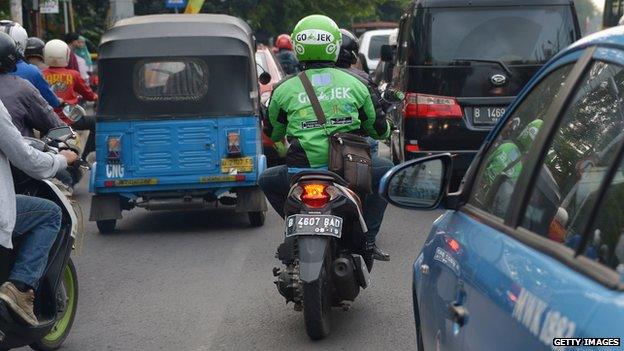
After just seven months Go-Jek now has 10,000 registered rides on its books
Within minutes a Go-Jek rider turned up, and she hopped on the back.
After a journey weaving around cars and lorries that perhaps wasn't suitable for those of a nervous disposition, Ms Hauser did indeed get to the airport on time.
"I was very content, and since then have become a regular Go-Jek customer," she says.
Commission model
The brainchild of 30-year-old Indonesian entrepreneur Nadiem Makarim, the Go-Jek app has been downloaded more than 500,000 times since the service launched in Jakarta at the start of this year.
Mr Makarim claims that no other app in Indonesia has reached half a million downloads so quickly.
With no money spent on advertising, the success has solely come thanks to positive world of mouth.
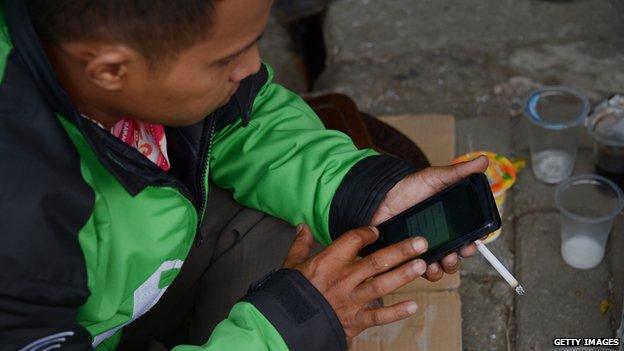
Go-Jek riders are given smart phones, so they can go to nearby jobs
While motorcycle taxis, known locally as ojek, have long been a popular form of transport in Jakarta, Go-Jek is the first attempt to introduce a hi-tech booking system and guaranteed service standards.
Outside of Go-Jek, ojek riders congregate on street corners, and are not officially registered. Payments have to be made in cash, and prices are a matter of negotiation.
By contract, Go-Jek recruits and trains its staff, who get uniforms, helmets, and a smart phone on which they manage their pick ups.
The company also sets standard fare levels, and provides its drivers with insurance.

Nadiem Makarim launched the business soon after he got married
Go-Jek now has no less than 10,000 riders on its books, based not just in Jakarta, but also across the cities of Bandung and Surabaya, and the island of Bali.
The company makes its money by taking a 20% commission from each journey.
Delivery men
Mr Makarim has been a regular ojek user since his early 20s, but he admits that his childhood journeys were often a lot more luxurious.
Born into an affluent Indonesian family, he would be taken to primary school in Jakarta in a chauffeur-driven car.
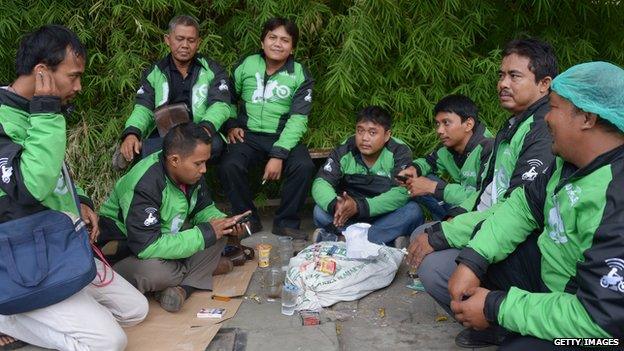
Go-Jek's team of riders all get training and insurance
Mr Markarim was then educated overseas, attending high schools in both New York and Singapore, before going to Brown University in the US state of Rhode Island to study international relations.
This was followed by getting a master of business administration degree from Harvard University in Boston.
Returning to Indonesia to work as a management consultant in Jakarta, the idea of creating Go-Jek came to him when he was speaking with his regular ojek rider.
Mr Markarim says: ""I asked him, 'how long do you work?'.
"The ojek driver said he normally works 14 hours a day.
"And, I also asked him how many orders he normally took in a day. He said about four or five, so it meant that for 70% to 75% of his work hours, he's not actually working, he just sits there waiting for customers."
Realising that there was a problem of supply and demand, Mr Markarim realised that developing a phone app could better connect would-be passengers with ojek riders, and via versa.
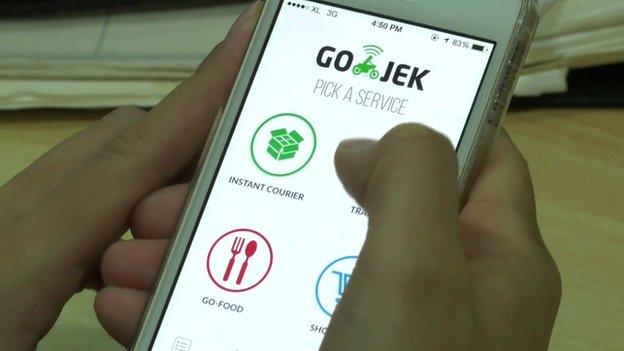
Customers can book a Go-Jek driver to go shopping for them
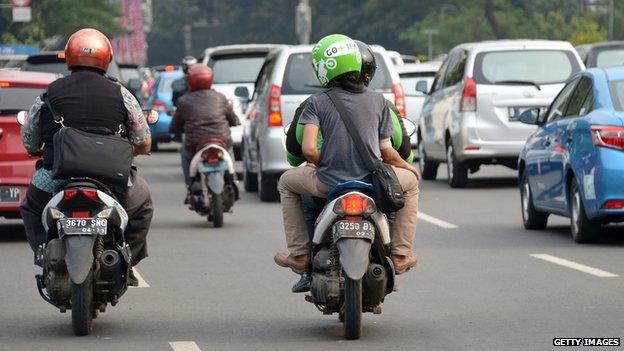
Motorcycle taxis have long been popular in Jakarta
He also decided that passengers would like to see an increased level of trust and accountability. Therefore the app allows customers to see the distance to their destination, and calculate the exact cost of the journey.
For each kilometre (0.6 miles) travelled with Go-Jek, customers are charged 4,000 rupiah (29 cents; 20p).
Mr Markarim also came up with the idea of utilising Go-Jek riders as a fleet of delivery men, and even personal shoppers.
So instead of just using Go-Jek to transport themselves, customers can book a Go-Jek driver to collect a takeaway for them, or even do a food shop.
Mr Markarim says this gives the riders a new revenue steam, especially in times of the day when demand for passengers is low.
"This way, ojek drivers do not just earn money during rush hours," he says.
'My legacy'
To launch Go-Jek Mr Markarim quit a secure full-time job. Despite having recently married at the time, he felt it was a risk worth taking.
With the business proving a big success so far, he is proud of what he is achieving.
"We only live once," he says. "What do I want to tell to my grandkids about what I have done? Is it that I've made money or invented something that changed an industry forever?
"For me what I have been doing is a lot more than just making money. This is about what I leave as my legacy when I'm no longer around in this world."
Mr Markarim, who has since accepted investment from friends and other investors, now plans to expand his business operations by releasing a sister app called Go-Truk.
Go-Truk aims to show which lorries in Jakarta have spare space, which can then be more easily hired out.